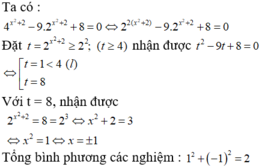4x2 -8=0
TT
Những câu hỏi liên quan
(4x2)8(4x2)4(4x2)2=? (x ≠ 0)
\(\left(4x^2\right)^8\cdot\left(4x^2\right)\cdot\left(4x^2\right)^2\)
\(=\left[\left(2x\right)^2\right]^8\cdot\left[\left(2x\right)^2\right]^4\cdot\left[\left(2x\right)^2\right]^2\)
\(=\left(2x\right)^{16}\cdot\left(2x\right)^8\cdot2x^4\)
\(=\left(2x\right)^{28}\)
Đúng 1
Bình luận (0)
tìm x
x6 +2x3+1=0
x(x-5)=4x-20
x4-2x2=8-4x2
(x3-x2)-4x2+8x-4=0
\(x^6+2x^3+1=0\)
\(\Leftrightarrow\left(x^3\right)^2+2x^3+1=0\)
\(\Leftrightarrow\left(x^3+1\right)^2=0\)
\(\Leftrightarrow x^3=\left(-1\right)^3\)
\(\Leftrightarrow x=-1\)
___________
\(x\left(x-5\right)=4x-20\)
\(\Leftrightarrow x\left(x-5\right)-4\left(x-5\right)=0\)
\(\Leftrightarrow\left(x-5\right)\left(x-4\right)=0\)
\(\Leftrightarrow\left[{}\begin{matrix}x=4\\x=5\end{matrix}\right.\)
_____________
\(x^4-2x^2=8-4x^2\)
\(\Leftrightarrow x^2\left(x^2-2\right)+\left(4x^2-8\right)=0\)
\(\Leftrightarrow x^2\left(x^2-2\right)+4\left(x^2-2\right)=0\)
\(\Leftrightarrow\left(x^2-2\right)\left(x^2+4\right)=0\)
\(\Leftrightarrow x^2=2\)
\(\Leftrightarrow x=\pm\sqrt{2}\)
_______________
\(\left(x^3-x^2\right)-4x^2+8x-4\)
\(\Leftrightarrow x^2\left(x-1\right)-4\left(x^2-2x+1\right)=0\)
\(\Leftrightarrow x^2\left(x-1\right)-4\left(x-1\right)^2=0\)
\(\Leftrightarrow\left(x-1\right)\left(x^2-4x+4\right)=0\)
\(\Leftrightarrow\left(x-1\right)\left(x-2\right)^2=0\)
\(\Leftrightarrow\left[{}\begin{matrix}x=1\\x=2\end{matrix}\right.\)
Đúng 2
Bình luận (0)
4x−2+xx+1x
Đọc tiếp
`4x=2+xx+1x<=>4x=2+3x<=>4x-3x=2<=>1x=2<=>x=2`
Đúng 1
Bình luận (1)
Giair phương trình1) 2x2-3x-20 7) (2x2-3x-4)2(x2-x)22) 4x2-7x-20 8) dfrac{2}{x+1}-dfrac{3}{x+2}dfrac{1}{3x+3}3) 4x2+5x-60 9) dfrac{x}{x-3}dfrac{1}{x+2}4) 4x2+5x-90 10) dfrac{4}{2x-3}-dfrac{7}{3x-5}05) 5x2-18x-80 11) dfrac{7}{x+2}+dfrac{2}{x+3}dfrac{1}{x^2+5x+6}6) (3x2+2x+4)2(x2-4)2 12) dfrac{4}{...
Đọc tiếp
Giair phương trình
1) 2x2-3x-2=0 7) (2x2-3x-4)2=(x2-x)2
2) 4x2-7x-2=0 8) \(\dfrac{2}{x+1}-\dfrac{3}{x+2}=\dfrac{1}{3x+3}\)
3) 4x2+5x-6=0 9) \(\dfrac{x}{x-3}=\dfrac{1}{x+2}\)
4) 4x2+5x-9=0 10) \(\dfrac{4}{2x-3}-\dfrac{7}{3x-5}=0\)
5) 5x2-18x-8=0 11) \(\dfrac{7}{x+2}+\dfrac{2}{x+3}=\dfrac{1}{x^2+5x+6}\)
6) (3x2+2x+4)2=(x2-4)2 12) \(\dfrac{4}{x-2}+\dfrac{x}{x+1}=\dfrac{x^2-2}{x^2-x-2}\)
Giúp em vs em đag cần câu tl gấp![]() em c.ơn trước
em c.ơn trước
giải phương trình làm dell gì, lớp 8 mà
Đúng 0
Bình luận (0)
Tìm x biết :
(4x2-3)2+8=0
`(4x^2-3)^2+8=0`
`(4x^2-3)^2=-8`
Vì `(4x^2-3)^2 >=0> -8` với mọi `x` nên PT trên vô nghiệm.
Đúng 1
Bình luận (0)
b. 4x2 +4x+1=0 d. 5x2 6x1=0 a. 2x2-5x+1=0 c. -3x2 +2x+8=0 e. -3x2+ 14x - 8=0 g. -7x2 +4x-3=0
a. 2x2-5x+1=0
△= b2 - 4ac = (-5)2 - 4*2*1 = 17 ⇒√△ = √17
\(\Rightarrow x_1=\frac{5+\sqrt{17}}{4};x_2=\frac{5-\sqrt{17}}{4}\)
Vậy .... S={\(\frac{5\pm\sqrt{17}}{4}\)}
b. 4x2 +4x+1=0
⇔(2x+1)2 = 0 ⇔ x=\(\frac{-1}{2}\)
c. -3x2 +2x+8=0
△' = b'2 - ac = 12 - (-3)*8 = 25 ⇒√△ = 5
\(\Rightarrow x_1=\frac{-1+5}{-3}=-\frac{4}{3};x_2=\frac{-1-5}{-3}=2\)
Vậy... S={-\(\frac{4}{3}\);2}
d. 5x2 6x1=0 (thiếu dấu nên mk chưa giải được)
e. -3x2+ 14x - 8=0
△' = b'2 - ac = 72 - (-3)*(-8) = 25 ⇒ √△ = 5
⇒\(x_1=\frac{-7+5}{-3}=\frac{2}{3};x_2=\frac{-7-5}{-3}=4\)
Vậy .... S={\(\frac{2}{3};4\)}
g. -7x2 +4x-3=0
△' = b'2 - ac = 22 - (-7)*(-3) = -17<0
Vậy pt vô nghiệm , S=∅
Đúng 0
Bình luận (4)
tìm các số nguyên x,y biết : 4x2 +8y2+8xy+4y-8=0
=>4x^2+8xy+4y^2+4y^2+4y+1-9=0
=>(2x+2y)^2+(2y+1)^2=9
mà x,y nguyên
nên (2y+1)^2=9 và (2x+2y)^2=0
=>x+y=0 và \(2y+1\in\left\{3;-3\right\}\)
=>\(\left(x,y\right)\in\left\{\left(-1;1\right);\left(2;-2\right)\right\}\)
Đúng 0
Bình luận (0)
Giải phương trình:
a) 2x2 + 3x - 27 =0
b) -10x2 + x + 3 =0
c) -x3 + x2 + 4 =0
d) x3 - 4x2 - 8x +8 =0
a: =>2x^2+9x-6x-27=0
=>x(2x+9)-3(2x+9)=0
=>(2x+9)(x-3)=0
=>x=3 hoặc x=-9/2
b: =>-10x^2+6x-5x+3=0
=>-2x(5x-3)-(5x-3)=0
=>(5x-3)(-2x-1)=0
=>x=-1/2 hoặc x=5/3
c: =>-x^3+2x^2-x^2+4=0
=>-x^2(x-2)-(x-2)(x+2)=0
=>(x-2)(-x^2-x-2)=0
=>x-2=0
=>x=2
d: =>(x^3+8)-4x(x+2)=0
=>(x+2)(x^2-2x+4)-4x(x+2)=0
=>(x+2)(x^2-6x+4)=0
=>x=-2 hoặc \(x=3\pm\sqrt{5}\)
Đúng 2
Bình luận (0)
Tính tổng bình phương các nghiệm của phương trình 4 x 2 + 2 - 9 . 2 x 2 + 2 + 8 = 0
A. 2
B. 4
C. 17
D. 65
Tìm nghiệm của đa thức :
H(x) = 4x2 - 64 =0
K(x) =(2x+8)2 =0
Cho `H(x)=0`
`=>4x^2-64=0`
`=>(2x-8)(2x+8)=0`
`@TH1:2x-8=0=>2x=8=>x=4`
`@TH2:2x+8=0=>2x=-8=>x=-4`
Vậy nghiệm của `H(x)` là `x=4` hoặc `x=-4`
______________________________________________
Cho `K(x)=0`
`=>(2x+8)^2=0`
`=>2x+8=0`
`=>2x=-8`
`=>x=-4`
Vậy nghiệm của `K(x)` là `x=-4`
Đúng 4
Bình luận (0)
Tìm nghiệm của đa thức:
H(x) = 4x2 - 64 = 0
= x2 -16 = 0
= ( x - 4 ) ( x + 4 ) = 0
=> x = -4 hoặc x = 4.
K(x) = ( 2x + 8 ) 2 = 0
= 2x + 8 = 0
= 2x = -8
= x = -8 : 2
=> x = -4.
Đúng 1
Bình luận (0)
b. K(x) = (2x+8) . 2 = 0
=> 4x + 16 = 0
=> 4x = -16
=> x = -4
Đúng 1
Bình luận (0)









